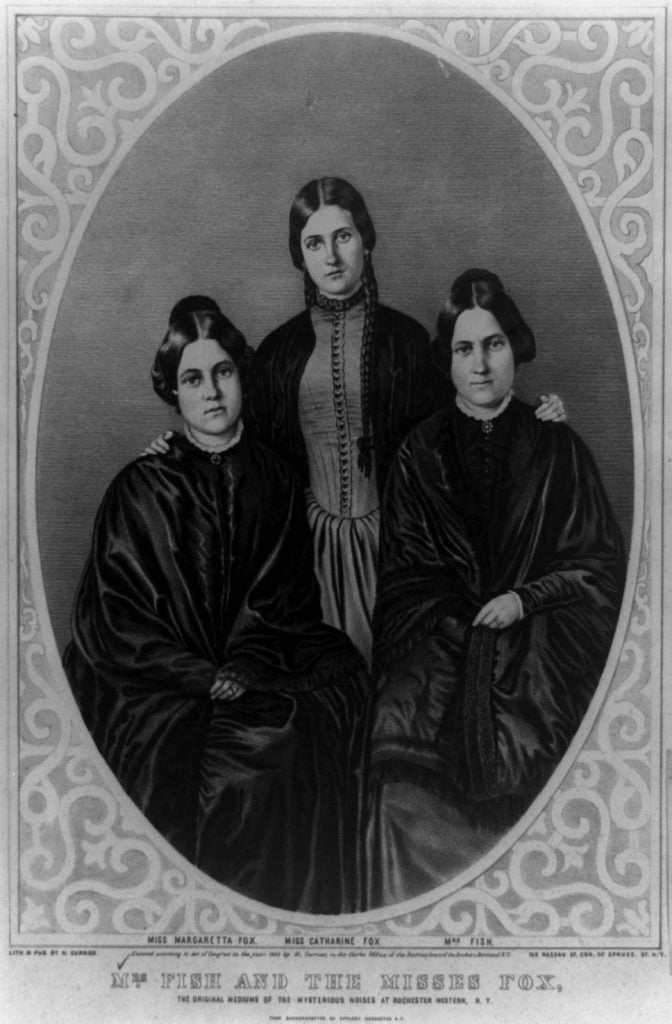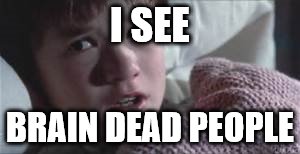
Posted on 01/18/2021 10:24:45 AM PST by Red Badger

The Fox sisters: Kate (1838-92), Leah (1814-90) and Margaret (or Maggie) (1836-93). Lithograph after a daguerreotype by Appleby. Published by N. Currier, New York. In 1848, two sisters from upstate New York, Maggie and Kate Fox, reported hearing ‘rappings’ and ‘knocks’ that they interpreted as communication coming from a spirit in their house. These events and these sisters would eventually be considered the originators of Spiritualism. Credit: N. Currier, New York
---------------------------------------------------------------------------------------
Spiritualist mediums might be more prone to immersive mental activities and unusual auditory experiences early in life, according to new research.
This might explain why some people and not others eventually adopt spiritualist beliefs and engage in the practice of “hearing the dead,” the study led by Durham University found.
Mediums who “hear” spirits are said to be experiencing clairaudient communications, rather than clairvoyant (“seeing”) or clairsentient (“feeling” or “sensing”) communications.
The researchers conducted a survey of 65 clairaudient spiritualist mediums from the Spiritualists’ National Union and 143 members of the general population in the largest scientific study into the experiences of clairaudient mediums.
They found that these spiritualists have a proclivity for absorption — a trait linked to immersion in mental or imaginative activities or experience of altered states of consciousness.
Mediums are also are more likely to report experiences of unusual auditory phenomena, like hearing voices, often occurring early in life.
Many who experience absorption or hearing voices encounter spiritualist beliefs when searching for the meaning behind, or supernatural significance of, their unusual experiences, the researchers said.
The findings are published in the journal Mental Health, Religion and Culture. The research is part of Hearing the Voice — an interdisciplinary study of voice-hearing based at Durham University and funded by the Wellcome Trust.
Spiritualism is a religious movement based on the idea that human souls continue to exist after death and communicate with the living through a medium or psychic.
Interest in Spiritualism is increasing in Britain with several organizations supporting, training, and offering the services of practicing mediums. One of the largest, the SNU, claims to serve at least 11,000 members through its training college, churches, and centers.
Through their study, the researchers gathered detailed descriptions of the way that mediums experience spirit “voices,” and compared levels of absorption, hallucination-proneness, aspects of identity, and belief in the paranormal.
They found that 44.6 percent of spiritualist participants reported hearing the voices of the deceased on a daily basis, with 33.8 percent reporting an experience of clairaudience within the last day.
A large majority (79 percent) said that experiences of auditory spiritual communication were part of their everyday lives, taking place both when they were alone and when they were working as a medium or attending a spiritualist church.
Although spirits were primarily heard inside the head (65.1 percent), 31.7 percent of spiritualist participants said they experienced spirit voices coming from both inside and outside the head.
When rated on scales of absorption, as well as how strongly they believe in the paranormal, spiritualists scored much more highly than members of the general population.
Spiritualists were less likely to care about what others thought of them than people generally, and they also scored more highly for proneness to unusual hallucination-like auditory experiences.
Both high levels of absorption and proneness to such auditory phenomena were linked to reports of more frequent clairaudient communications, according to the findings.
For the general population, absorption was associated with levels of belief in the paranormal, but there was no significant corresponding link between belief and hallucination-proneness.
There was also no difference in levels of superstitious belief or proneness to visual hallucinations between spiritualist and non-spiritualist participants.
Spiritualists reported first experiencing clairaudience at an average age of 21.7 years. However, 18 percent of spiritualists reported having clairaudient experiences ‘for as long as they could remember’ and 71 percent had not encountered Spiritualism as a religious movement prior to their first experiences.
The researchers say their findings suggest that it is not giving in to social pressure, learning to have specific expectations, or a level of belief in the paranormal that leads to experiences of spirit communication.
Instead, it seems that some people are uniquely predisposed to absorption and are more likely to report unusual auditory experiences occurring early in life. For many of these individuals, spiritualist beliefs are embraced because they align meaningfully with those unique personal experiences.
Lead researcher Dr. Adam Powell, in Durham University’s Hearing the Voice project and Department of Theology and Religion, said: “Our findings say a lot about ‘learning and yearning’. For our participants, the tenets of Spiritualism seem to make sense of both extraordinary childhood experiences as well as the frequent auditory phenomena they experience as practicing mediums.
“But all of those experiences may result more from having certain tendencies or early abilities than from simply believing in the possibility of contacting the dead if one tries hard enough.”
Dr. Peter Moseley, co-author on the study at Northumbria University, commented: “Spiritualists tend to report unusual auditory experiences which are positive, start early in life and which they are often then able to control. Understanding how these develop is important because it could help us understand more about distressing or non-controllable experiences of hearing voices too”
Durham’s researchers are now engaged in further investigation of clairaudience and mediumship, working with practitioners to gain a fuller picture of what it is like to be on the receiving end of such unusual and meaningful experiences.
Reference: 18 January 2021, Mental Health, Religion and Culture. DOI: 10.1080/13674676.2020.1793310
Hey, they vote, why can’t they be heard too?
For we wrestle not against flesh and blood, but against principalities, against powers, against the rulers of the darkness of this world, against spiritual wickedness in high places.
Deja vu, all over again......

The Amazing Randi never got to give away his million dollar cashiers check.
Have any of you visited Lily Dale in upstate New York?
The best way to figure out how a radio works is to take it apart and look for the radio station studio inside...
Science!
It’s the devil. Familiar spirits tricking people


These people have always existed. And suckers have always fallen for it. Yet we have “scientists” with no more success than mediums or witch doctors. We call them mental health practitioners.
At least mediums dont give people electrically ruined brains or give them drugs that turn them into prrmanently damaged homeless, or cause them to muder their families or coworkers.
I’ll take mediums any day over shrinks. Mediums dont pretend to be scientific.
Demons can take on various forms and voices. So many people and therefore generations are being fooled. https://www.gotquestions.org/what-is-a-medium.html
Hopefully, we’ll have our paranormal paypal system up and running again soon.

After the Civil War there were huge numbers of people who needed to be somehow consoled. These frauds understood the need and provided a service of sorts. It was fake but it no doubt gave a modicum of peace to some.
Psychics arguing:
“I saw it first!”
“No, I saw it first!”
“I saw it before you did!”
“I saw it way before you!”...................................

Disclaimer: Opinions posted on Free Republic are those of the individual posters and do not necessarily represent the opinion of Free Republic or its management. All materials posted herein are protected by copyright law and the exemption for fair use of copyrighted works.